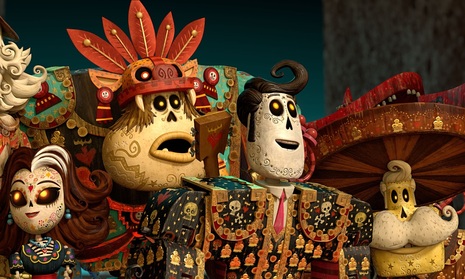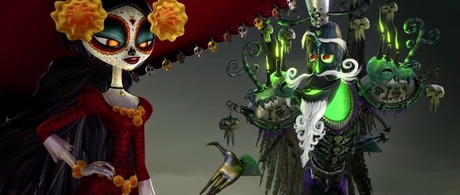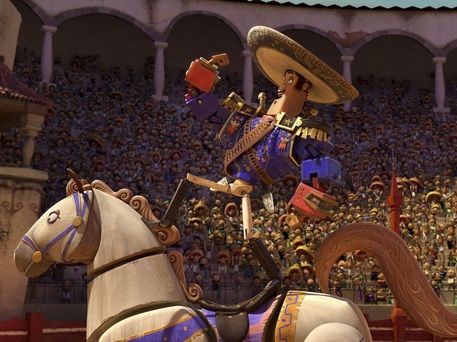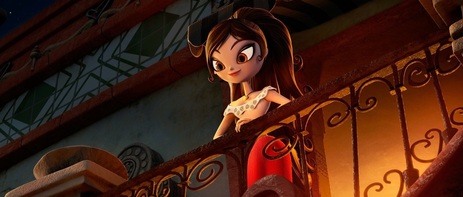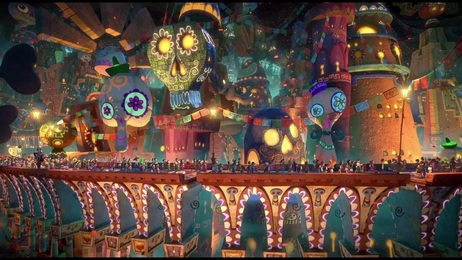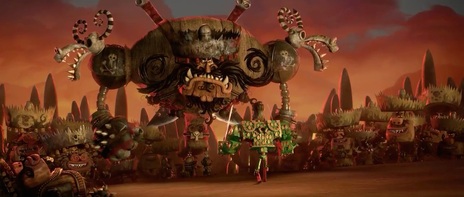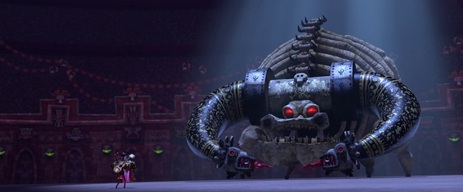Book of Life
|
|
Positively bursting with colour and culture, The Book of Life is a wonderful spectacle of animation. It is the first directorial feature of Jorge Gutiérrez, best known for his work on various Latin themed animated TV shows for children, such as !Mucha Lucha! (2002) and El Tigre: The Adventures of Manny Rivera (2007-2008). Add to this the attachment of Guillermo Del Toro as producer and it is no surprise the film is receiving high praise.
Drawn from the rich vaults of Mexican folklore, The Book of Life tells the story of two ancient spirits - La Muerte (voiced by Kate del Castillo), Queen of the Land of the Remembered, and Xibalba (Del Toro regular Ron Perlman), King of the Land of the Forgotten - and their wager about which of two mortals will marry the girl they both love. La Muerte blesses her champion Manolo (Emil-Bastien Bouffard/Diego Luna) with courage and kindness. Xibalba offers his advocate Joaquín (Elias Garza/Channing Tatum) a medal that will make him invincible. But ultimately the choice will be made by the clever and virtuous Maria (Genesis Ochoa/Zoe Saldana), the object of their affections. The premise is introduced by a tour guide explaining these events to an unruly handful of children, with wooden marionette puppets representing the key players. This arguably unnecessary framing provides a basis for the distinctive artistic style of the film, presenting the characters as carefully crafted and painted wooden figures, punctuating a beautiful and patchwork world where pins and moving joints are clearly visible on the bodies of the characters. The visuals are incredibly striking and faithful to Mexican traditions but sadly the same cannot be said for the music. A variety of western pop songs permeate the score. From Mumford and Sons to Radiohead, the film has no shortage of recognisable tunes, an unwelcome presence in a world of otherwise very authentic Mexican culture. “When is the Mexican princess going to show up?” Jorge Gutiérrez asked at this year’s San Diego Comic Con. It is a fine question, and an important one in American society, which enjoys a rich and growing Hispanic culture. María may be strong, intelligent and kind but she unfortunately suffers from being a Mary Sue. She is unrealistically perfect, devoid of flaws, responsible for none of the problems in the narrative and easily capable of solving all of them. That is, if it were not for her unfortunate status as the “Mexican princess” who is a prize to be won by the two men. She is on a pedestal, much like La Muerte herself, and from so high up, she is incapable of significantly impacting the events of the story, although she does play a major role in the final battle sequence. Whilst the dialogue is funny and expressive, the character motivations are problematic and, ironically, wooden. It is clear how María feels about Manolo and Joaquín, yet the desires of the male leads remain a mystery to us. Both men seem to simply be in love with María because she is there and the world they inhabit is somehow barren of any other realistic love interests. Like Jasmine and Aladdin, Tarzan and Jane, Cinderella and Prince Charming, Manolo and Joaquín are in love with María because…why not? This antiquated approach sours an otherwise delightful and intricately made film. In spite of its narrative issues, The Book of Life breaks new ground in other areas. As a torero (bullfighter), Manolo is expected by his father to fight bulls in the arena, which he does spectacularly, winning the respect of the entire town. However in the final moments of victory, Manolo cannot bring himself to kill the mighty bulls he has bested, earning nothing but scorn from both the townsfolk and his family. Manolo experiences pressure from everyone but María, who is awestruck by Manolo’s display of mercy. Manolo’s apparent weakness reaches a climax when Xibalba challenges Manolo to defeat every bull his family has ever killed in the arena, now restless in the world of the dead. His battle with the bull and its heartfelt resolution is easily the most genuine and profound moment of the entire film. Even if you are not interested in a stunningly vibrant animated feature, or a spectacular representation of long ignored Mexican culture, The Book of Life tells a story that is well worth hearing: a hero is not a product of their achievements and fame but they are defined by the pure intention and courage to do good and to right wrongs, even if it means great sacrifice. |

